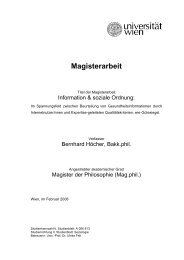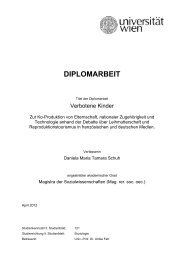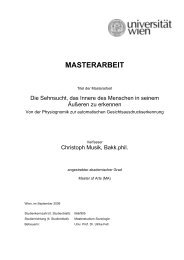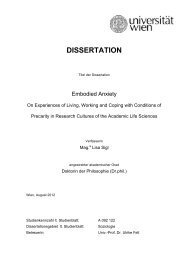MASTERARBEIT - Institut für Wissenschaftsforschung - Universität ...
MASTERARBEIT - Institut für Wissenschaftsforschung - Universität ...
MASTERARBEIT - Institut für Wissenschaftsforschung - Universität ...
Create successful ePaper yourself
Turn your PDF publications into a flip-book with our unique Google optimized e-Paper software.
2.1 count zeppelin’s biographyandbackground 9<br />
land. While stemming from a centuries-old lineage of nobility, his father’s<br />
line did not provide wealth but a very traditional and socially<br />
respected background. His mother’s lineage, however, a wealthy<br />
industrialist family, provided financial means and a completely different,<br />
liberal mindset. As a recent biographer [49, 795] notes, his<br />
mother’s father had given Girsberg as a present to his parents – so<br />
ironically, the family’s aristocratic lifestyle was financed by bourgeois<br />
money. His education is described as broad and very down to earth:<br />
as a boy, Zeppelin worked on the estate in all kinds of roles, herding<br />
cattle, serving in a pub, etc. but also being taught fencing and shooting<br />
by his father. He was thus brought up in both conscience of his<br />
noble roots and patriotism as Württembergian as well as liberal influences<br />
of his mother [11]. In 1855, he joined Württemberg’s military.<br />
By that time, Germany as a nation did not yet exist but was nothing<br />
more than a confederation (German Confederation, »Deutscher<br />
Bund« in German) of a multitude of different regional states - one of<br />
those was Württemberg. His career was exemplary and he became a<br />
famous war hero after a spectacular success of a reconnaissance mission<br />
in the Franco-Prussian war of 1870/1871 in which Württemberg<br />
fought as an ally to Prussia. This war led to the unification of Germany<br />
as a national state by founding the German Empire in Versailles<br />
on January 18th, 1871. From 1882 until 1885 Zeppelin was commanding<br />
officer of a cavalry regiment in Ulm, where he was made colonel<br />
in 1884. From 1885 on, he was military attaché to the envoy of Württemberg<br />
in Berlin and became his successor as envoy in 1887. Filling<br />
this position for two years, he returned into military service in 1889.<br />
As a patriotic Swabian he regarded the Prussian dominance in the<br />
newly founded empire with suspicion. When Germany as nationstate<br />
came into being after the Franco-Prussian war of 1871, Prussia<br />
had taken the leading role in the newly formed country. Having<br />
grown up in Württemberg and served as military officer during his<br />
entire career (and not only fighting alongside Prussians but also during<br />
the German war of 1866, in which Württemberg fought alongside<br />
Austria against and was defeated by Prussia), his Württembergian origin<br />
did not serve him well in the Prussian-led German Reich. One of<br />
his last acts as envoy was the writing of an essay harshly criticizing<br />
the Prussian command over the united German army – ultimately<br />
putting Württembergian military under Prussian control [11, 98 f.].<br />
This piece caused uproar in Berlin, up to the emperor himself criticizing<br />
Zeppelin [49, 798]. As a consequence of the disapproval his<br />
remarks caused, Zeppelin was displaced from the command post he<br />
had returned to after his service as envoy and was retired against his<br />
will. After a bad outcome in a review of his command – presumably<br />
as a reaction of the administration to his writing [11, 101 ff.] – he had<br />
to resign from military service in 1890 at age 52.







